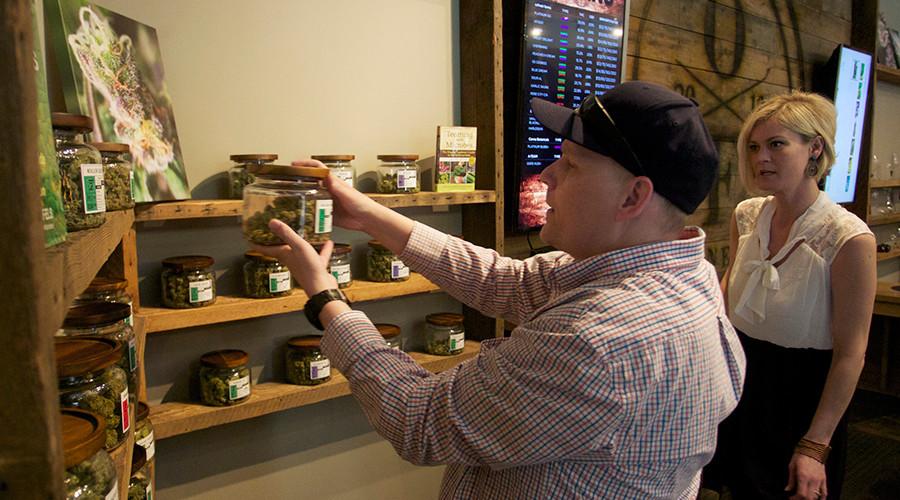
Offspring of pregnant lab mice subjected to doses of THC, the
main active ingredient in marijuana or cannabis, exhibited effects
lasting a lifetime, according to a study published in the official
journal of the National Academy of Sciences.
Mice,
like humans, are naturally equipped to receive cannabinoids, the
chemical compounds found in marijuana. The primary cannabinoid receptor,
CB1, sends signals to the brain, but when that signaling was
interrupted by THC, or tetrahydrocannabinol, its full development was
never realized in the in utero mice, even into adulthood.
Unlike humans, mice have very high concentrations of cannabinoid receptors where motor skills and coordination of movement are developed. That partially explains why it’s difficult to know the full implications for humans of this study, which was carried out by scientists from Complutense University of Madrid, Spain. Besides being a potential red flag for recreational marijuana use, this study could have implications for people who take prescription drugs for seizures that are cannabinoid-based.

“The available data does indicate that any adverse impact of maternal cannabis use is arguably less than the known adverse effects of tobacco and alcohol,” said Paul Armentano, deputy director for the National Organization for the Reform of Marijuana Laws, in an email to RT.
“Ultimately, treating cannabis like other legal, regulated substances means, in certain circumstances, discouraging its use among certain populations,” he said, adding that “no doubt one can argue that such distinctions also ought to be made for cannabis when the available evidence supports doing so.”
Does the evidence available call for discouraging marijuana use for pregnant women? Not quite. It’s more about erring on the side of caution, as other studies show inconclusive results.
There have also been other studies of marijuana’s impact on the offspring of pregnant women, rather than mice, which show little or no connection between prenatal marijuana use and birth defects. In 2010, the National Institutes for Health, an agency of the Department of Health and Human Services, found that “reported cannabis use does not seem to be associated with low birth weight or preterm birth.”

In 2009, a study by the University of Bristol in Great Britain found no psychotic symptoms related to maternal marijuana use, while it did show maternal use of tobacco and alcohol caused an increased risk of psychosis.
Two longitudinal studies to determine the effect on the brain development of pre-born humans were shown to be inconclusive. They are the Maternal Health Practices and Child Development Study (MHPCDS), which looked at “high-risk” pregnant women of low socio-economic status using marijuana, alcohol, and other substances, and the Ottawa Prenatal Prospective Study (OPPS), which looked at prenatal exposure to marijuana and tobacco smoking in “low-risk” subjects from high socio-economic backgrounds.
The Neuroscience and Behavioral journal in 2005 found these two studies showed “subtle” negative differences beyond infancy in cognition, while recommending further study to make a more comprehensive conclusion.
Unlike humans, mice have very high concentrations of cannabinoid receptors where motor skills and coordination of movement are developed. That partially explains why it’s difficult to know the full implications for humans of this study, which was carried out by scientists from Complutense University of Madrid, Spain. Besides being a potential red flag for recreational marijuana use, this study could have implications for people who take prescription drugs for seizures that are cannabinoid-based.

“The available data does indicate that any adverse impact of maternal cannabis use is arguably less than the known adverse effects of tobacco and alcohol,” said Paul Armentano, deputy director for the National Organization for the Reform of Marijuana Laws, in an email to RT.
“Ultimately, treating cannabis like other legal, regulated substances means, in certain circumstances, discouraging its use among certain populations,” he said, adding that “no doubt one can argue that such distinctions also ought to be made for cannabis when the available evidence supports doing so.”
Does the evidence available call for discouraging marijuana use for pregnant women? Not quite. It’s more about erring on the side of caution, as other studies show inconclusive results.
There have also been other studies of marijuana’s impact on the offspring of pregnant women, rather than mice, which show little or no connection between prenatal marijuana use and birth defects. In 2010, the National Institutes for Health, an agency of the Department of Health and Human Services, found that “reported cannabis use does not seem to be associated with low birth weight or preterm birth.”

In 2009, a study by the University of Bristol in Great Britain found no psychotic symptoms related to maternal marijuana use, while it did show maternal use of tobacco and alcohol caused an increased risk of psychosis.
Two longitudinal studies to determine the effect on the brain development of pre-born humans were shown to be inconclusive. They are the Maternal Health Practices and Child Development Study (MHPCDS), which looked at “high-risk” pregnant women of low socio-economic status using marijuana, alcohol, and other substances, and the Ottawa Prenatal Prospective Study (OPPS), which looked at prenatal exposure to marijuana and tobacco smoking in “low-risk” subjects from high socio-economic backgrounds.
The Neuroscience and Behavioral journal in 2005 found these two studies showed “subtle” negative differences beyond infancy in cognition, while recommending further study to make a more comprehensive conclusion.

No comments:
Post a Comment